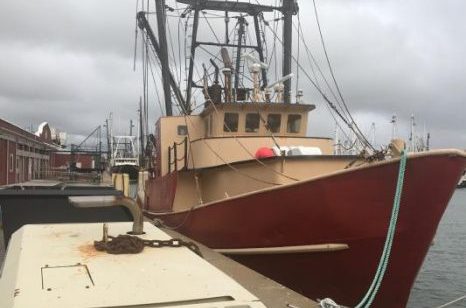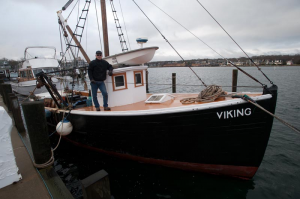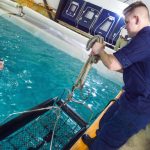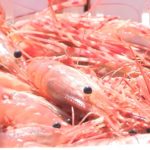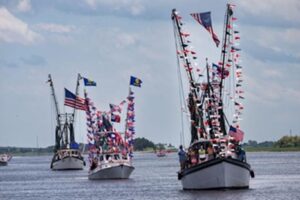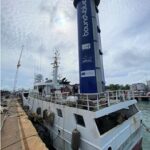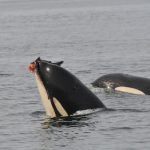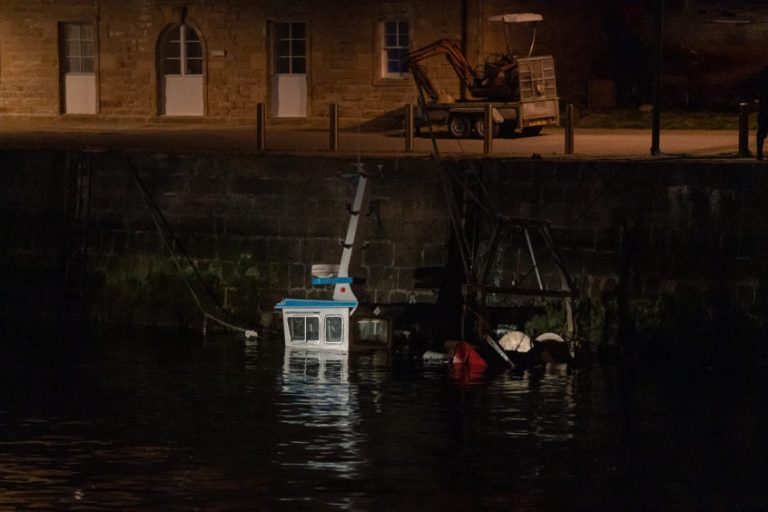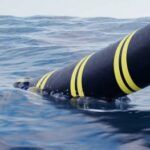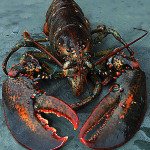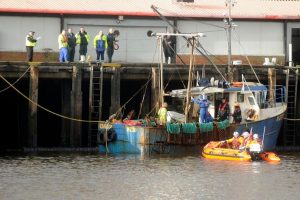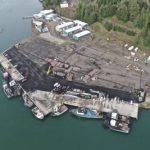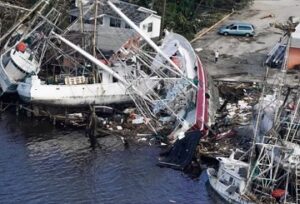Monthly Archives: March 2019
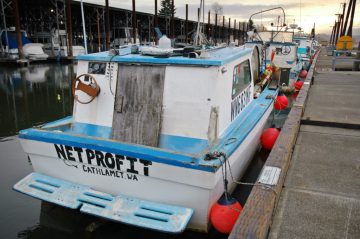
Columbia River Reforms – Change to gillnet policy stokes sport fishing anger
In a vote that has angered the sport fishing community, the Washington Fish and Wildlife Commission (WFWC) has voted to alter the Columbia River Salmon Policy 3620, known as the Columbia River Reforms, concerning the use of gillnets in the main stem Columbia River. The vote was held on March 2 in Spokane. The changes to the policy follow a five-year review, and recommendations from a joint-state task force that is composed of three commissioners from both states.,,, Hobe Kytr of Salmon For All, a commercial fishing advocacy group, sees the action as appropriate. “The policy that was enacted at the request of former Oregon Governor John Kitzaber has been a failure from the very beginning,” said Kytr. “It was a matter of putting a policy in place and then trying to find the scientific facts to back up the policy.” >click to read<11:30
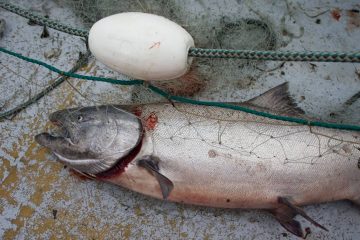
County board voices opposition to bill to end non-tribal gillnetting in Washington
Wahkiakum County commissioners on Tuesday agreed to contact the state senate to oppose legislation that would outlaw non-tribal gillnet commercial fisheries in Washington Jan. 1, 2023, and establish a buyout program for retiring licenses by Dec. 31, 2022. Proponents say gillnets are non-selective gear that ensnare wild and endangered salmon and with other species, they are not a good management, and they adversely impact the recreational fishing industry. Senate Bill 5617 would also establish a three-tier program to buy out gillnetters’ licenses from willing sellers.,,, >Click to read<11:01
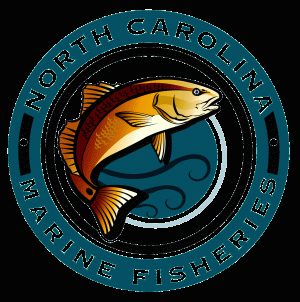
N.C. Division of Marine Fisheries issues proclamations that close striped bass season
N.C. Division of Marine Fisheries has issued proclamations that close striped bass season for commercial and recreational fishermen in all internal waters from just south of Oregon Inlet to the South Carolina line. Both commercial and recreational fishermen across the state could find themselves heavily impacted as the result of a new fishing ban passed at the special meeting Wednesday in Kinston. The commission passed a motion by a vote of 5-4 to ban the use of gill nets above what are known as the ferry lines, in areas of the Pamlico and Neuse Rivers. >click to read<10:06
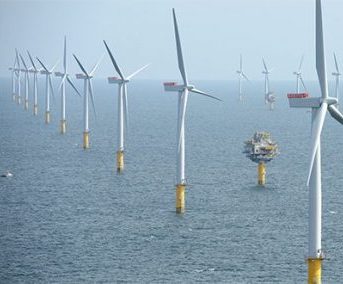
Windmills On The Best Fishing Grounds? Let’s stand up for our fishing resource, a nationally vital food supply.
First of all, why in the hell would anyone want to plant complex machinery, such as wind turbines, in an offshore marine environment in over 100 feet of water …if there were any alternative sites at all? It makes no sense. Only if, perhaps they are so repugnant that on land they will not be tolerated within sight of civilization. So put them “Safely out to sea” and out of sight! This push for offshore wind on the best fishing grounds is motivated by irresponsible and mindless greed! It is not cost effective, not a good long term business plan. And it is certainly not healthy for the ocean ecosystem, or for food security. >click to read<20:11
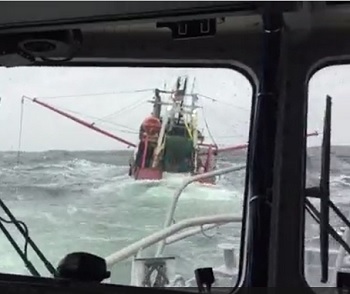
Sunken boat near Fishers Island monitored for pollution threat
The U.S. Coast Guard and the state Department of Environmental Conservation are assessing potential pollution off the coast of Fishers Island after a “patchy sheen” was seen surrounding a fishing trawler that sank Sunday morning. Two men aboard a commercial fishing boat named “All For Joy” and based out of Hampton Bays issued a distress call about 7:30 a.m. Sunday after they began taking on water in a fish hold. They abandoned the trawler about two hours later and were pulled aboard a Coast Guard rescue vessel a minute before the All For Joy capsized. The boat is owned by Rick Lofstad, who could not be reached for comment Tuesday. >click to read<15:43
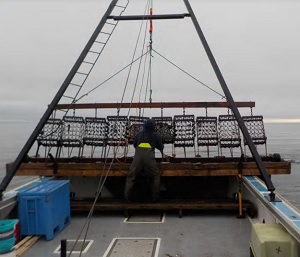
How a small change in scallop gear could make a big difference on P.E.I.
Some Island scallop harvesters are adjusting the way they do their work this year, in the hopes that it’ll help make the fishery more sustainable. The idea is that by increasing the size of the holes, or rings, in the trawler used to fish scallops, only larger ones will be caught, leaving younger ones to grow and multiply. With this in mind, Fisheries and Oceans Canada has changed the minimum ring size for one of the scallop fishing areas surrounding Prince Edward Island, Zone 22.,It was aboard Island scallop harvester Richard Gallant’s boat that this research took place last spring — with assistance from the P.E.I. Fishermen’s Association. Gallant has been harvesting scallops for more than two decades, and said he’s been advocating for changes like these for a while.,, >click to read<14:11
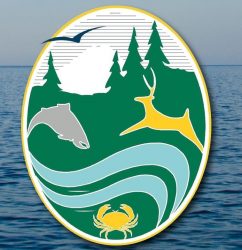
Options presented for Washington’s ocean salmon fisheries based on predictions
Fish managers released their options for Washington’s ocean salmon fisheries that reflect recent concerns over projected chinook stocks and optimism about improved returns of coho. Three options for ocean salmon fisheries were approved Tuesday for public review by the Pacific Fishery Management Council (PFMC). Kyle Adicks, salmon fisheries policy lead for the Washington Department of Fish and Wildlife says that the three alternatives are designed to protect the low numbers of chinook expected to return to the Columbia River and Washington’s ocean waters. >click to read<13:00
Athearn Marine Agency Boat of the Week: 78′ Stacked Wheelhouse Steel Scalloper, 600HP, CAT 3412
Specifications, information and 3 photos >click here< To see all the boats in this series, >click here<12:08
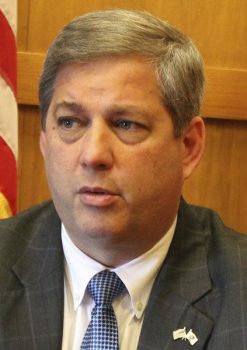
Sen Bruce Tarr champions expanded in-state lobster processing, proposal backed by Senate
The state Senate has approved a measure authored by Gloucester Sen. Bruce Tarr, and championed by a bi-partisan coalition of state senators, that will reform state lobster laws would permit licensed wholesale dealers to process unfrozen lobster parts, import unfrozen shell-on lobster parts, and allow for the sale of processed lobster parts.,, “We have the second-largest lobster catch in the nation yet, without this bill, our raw and frozen lobster parts are processed in Canada or Maine only to then be brought back to local consumers,” said Tarr. >click to read<11:27

Yacht captain gets probation in death of Stonington fisherman Walter Krupinski
A New Jersey yacht captain has been sentenced to two years probation and ordered to pay $1,800 of restitution after pleading guilty to colliding with a small fishing boat off Westerly in 2015, killing its captain, 81-year-old Walter Krupinski of Stonington. In sentencing documents, the attorney for Cooper Bacon disputed the findings of a Coast Guard investigation which found he was at fault for Krupinski’s death but said Bacon pleaded guilty to manslaughter “to avoid protracting the pain of this accident any further for both Mr. Krupinski’s family and his own.” As part of the sentencing agreement, Bacon surrendered his Coast Guard 100-ton merchant mariner’s certificate, agreed not to work as a captain for hire and is limited to operating a small personally-owned boat.,,, Krupinski’s wife, Peggy, said Tuesday that she did not feel the probation and the reimbursement of the money she had to spend to dispose of the damaged boat, was enough of a sentence. “To me, he got off pretty easy,” she said. >click to read<10:04
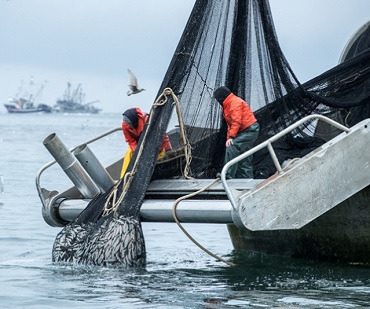
Roe herring fishery opens under watchful eye of Tla’amin
The controversial roe herring fishery is opening this month despite an intense public campaign to shut it down. Seiners have been seen off Vancouver Island and Tla’amin Nation is watching what unfolds carefully. “We have treaty fishing rights and the treaty rights do stretch over to just short of Vancouver Island,” said Tla’amin hegus Clint Williams. “What we’ve done is we’ve asked [Fisheries and Oceans Canada] to stay out of the inside waters here.”So far, they have. >click to read<21:05
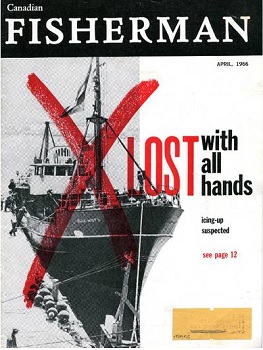
Down Memory Lane: From side trawlers to stern trawlers
The introduction of stern trawlers to the Burin Peninsula deep-sea fishery in the 1960s was a real game changer. Bonavista Cold Storage Company of Grand Bank had the province’s first stern trawler, the Grand Monarch, built in 1963. At the time BCS was also operating five other conventional side trawlers. In 1967 the company took delivery of the Grand Prince, the first of four larger stern trawler sister-ships, designed specifically to fish in challenging North Atlantic waters. These larger and newer vessels provided more comfort and safety. >click to read<19:51
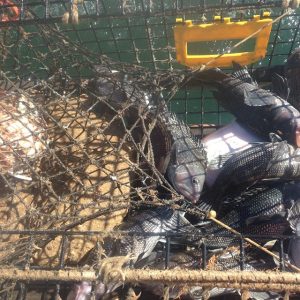
Black sea bass gobbling up lobsters
Black sea bass, a saltwater fish taken commercially and recreationally in Massachusetts, have increased in number throughout southern New England waters and rattled the lobster industry with their wolfish appetites. “They feed aggressively,” Rutgers University marine biologist Olaf Jensen said. “They’re not picky eaters. If it’s the right size and it’s alive, they’ll eat it.” The young of New England’s iconic crustacean fall into the right size category. “Black sea bass love little lobsters,” Michael Armstrong, assistant director of the Massachusetts Division of Marine Fisheries, said. That’s of deep concern to Beth Casoni, president of the Massachusetts Lobstermen’s Association, who says lobster traps are being pillaged by these fish. >click to read<18:41
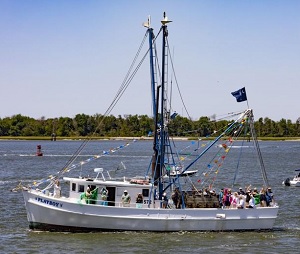
Maritime Center ice machine breaks leaving shrimp fleet troubled
The ice machine at Charleston Maritime Center broke in November 2018. As a result, shrimp boats throughout Charleston and Shem Creek are starting to fret about how they’ll keep their shrimp cold this season. Jack O’Toole, director of communications for the City of Charleston explained that the Environmental Protection Agency (EPA) recently changed ice machine regulations.,,, Tommy Edwards, captain of the shrimp boat Playboy, docks his boat at Wreck of the Richard & Charlene. Edwards said he’s been going to the Maritime Center since they opened for ice because it’s the only resource he has. Edwards said that he called the Maritime Center on March 4 and found out they didn’t have plans to replace the ice machine.“The only way I found out is I called them. They didn’t notify us. They’re letting us hang on thinking it’s back to the regular routine,” Edwards said. >click to read<17:52
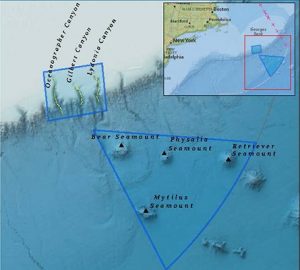
Trump’s national monument changes return to spotlight
But in the 15 months since Trump downsized the Utah monuments, the president has done nothing with Zinke’s proposal to shrink two more monuments, in Oregon and Nevada, and change rules at six others, including allowing commercial fishing inside three marine monuments in waters off New England, Hawaii and American Samoa.,, Zinke is now gone ,,, commercial fishing operators who say jobs will be lost unless Trump reverses Obama’s 2016 creation of the Northeast Canyons and Seamounts monument off the New England coastline, where boats previously targeted squid, swordfish, tuna and other fish. Bonnie Brady, executive director of the Long Island Commercial Fishing Association, recalled meeting with Zinke in 2017 to air the industry’s concerns. >click to read<16:40
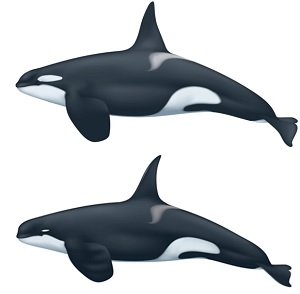
TYPE D – Mysterious killer whales seen off the coast of Chile could be a new species
Deep beneath some of the world’s roughest seas live a mysterious species of killer whales that look very different from other orcas. For the first time after it was spotted off the coast of Chile, the killer whale, which could potentially be a new species altogether, is to be studied by an international team of scientists.,,, Bob Pitman, a marine ecologist who was part of the team that spotted the whales, said that Type D killer whales could be the largest undescribed animal left on the planet,,,, >click to read<14:21
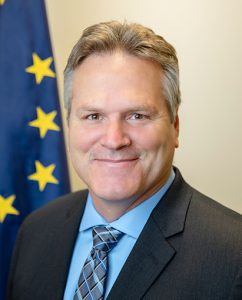
Governor Dunleavy Announces Nominations to North Pacific Fishery Management Council
Alaska Governor Michael J. Dunleavy last week made his nominations for the two State of Alaska seats on the North Pacific Fishery Management Council (NPFMC). “I have nominated individuals who are knowledgeable and experienced in the harvest, conservation, and management of fishery resources,” Governor Dunleavy wrote of the nominees in a letter to Chris Oliver, Assistant Administrator for NOAA Fisheries. >click to read<13:40

Change Islands harvester says removal of herring license unjustified after request to reinstate denied
A Change Islands fisherman has lost a license over what he calls an “honest mistake.” It’s one Lloyd White hopes will serve as a warning for other harvesters. In a letter from the Department of Fisheries and Oceans (DFO) Regional Licensing Review Committee, dated Feb. 13, White was denied an appeal to reinstate his herring license. The 58-year-old lost the license when his wife Heather accidentally left the license unpaid in their online paperwork in 2017. >click to read<12:25

The Columbia River Reform Plan – Letter: Thanks for reporting facts
After reading the letter “Don’t support gillnetting” (The Daily Astorian, March 7), I felt compelled to offer a factual response.,, The statement that the Columbia River endorsement fee on recreational licenses was intended to buy out or eliminate gillnetters is simply false. The money has been used for overall projected improvements to fisheries, including researching new off-channel select fishing areas (none were found viable), testing alternative gear (none proved to be better than gillnets), research and monitoring commercial fisheries, additional hatchery production to benefit both recreational and commercial fisheries, and commercial and recreational fisheries law enforcement. I am fairly confident most of the hardworking blue-collar commercial fishing families in the lower Columbia don’t worry much about the economy in Vancouver, Washington, where the author lives, but they sure care about their own, and so does The Daily Astorian. >click to read<10:43
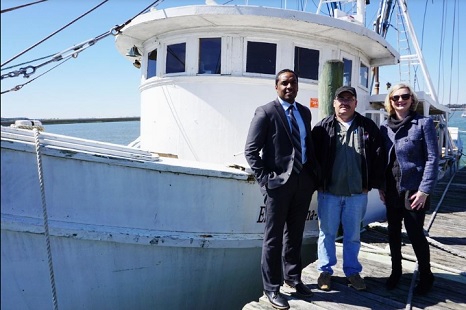
U.S. Attorney’s Office sells convicted Tybee shrimper’s boat for $15K
A shrimp boat seized in a federal fraud investigation has a new home with a North Carolina seafood company. Assistant U.S. Attorneys with the Southern District of Georgia’s Asset Recovery Unit recently completed the sale of the 80-foot trawler to Lee Bland Williams of Scranton, N.C. Williams and his wife, Madge, own Hobo Seafood, a commercial fishing operation in Swanquarter, N.C. He purchased the boat for $15,000, and said despite significant repairs, the craft needs to make it seaworthy, he plans to have it ready for this summer’s shrimping season. >click to read<19:51
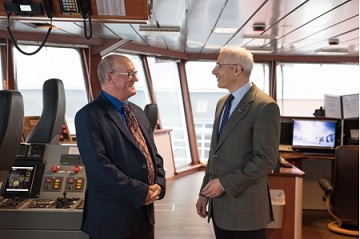
Fourteen First Nations announce landmark agreement with Clearwater on Arctic Surf Clam
Fourteen First Nations communities in Nova Scotia and Newfoundland and Labrador and Clearwater Seafoods Incorporated (“Clearwater”) (TSX: CLR) are pleased to announce they have reached a landmark agreement to the benefit of all parties. The Agreement forges a 50-year partnership that protects existing jobs in the Arctic Surf Clam fishery while creating meaningful economic, employment and capacity building for the fourteen First Nations that are adjacent to the clam resource. >click to read<19:09
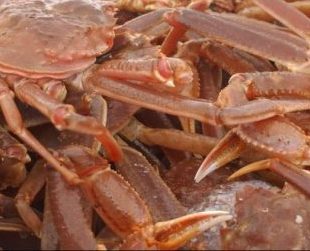
EDITORIAL: Continued suspension of snow crab fishery’s MSC certification seems excessive
Southern Gulf snow crab fishermen took on new challenges of reduced fishing area and temporary closures last year all for the sake of protecting North Atlantic right whales from potential entanglement in fishing gear. They made changes to their gear, too, and their efforts were successful. There were no reported deaths of endangered North Atlantic right whales in Canadian waters in 2018. That’s in sharp contrast to the unprecedented 12 documented deaths in Canadian waters in 2017. But it’s still not good enough for the Marine Stewardship Council. >click to read<17:32
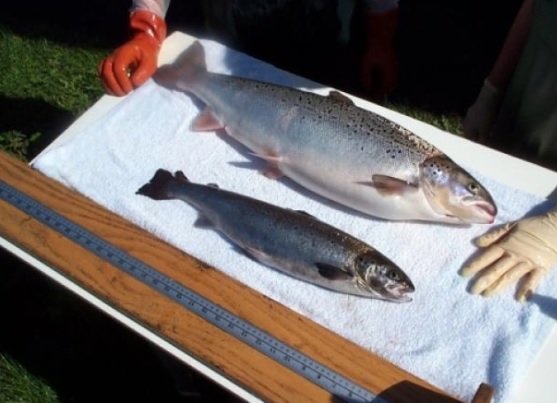
AquaBounty cleared to export genetically-engineered salmon eggs to U.S.
The U.S. Food and Drug Administration has lifted a ban on genetically-engineered salmon imports, allowing the company AquaBounty to export eggs it is producing at its facility in Bay Fortune, P.E.I. In a news release, AquaBounty’s CEO Sylvia Wulf said the company is aiming to send the eggs to its plant in Indiana, where they will be hatched and grown to market size. >click to read<14:01

The story of how salmon got to the Great Lakes, told by the man who made it happen
Close to 10 million chinook and coho salmon swim in Lake Michigan, Lake Huron and Lake Superior. There were none when Howard Tanner started as the chief of the Michigan Department of Conservation’s Fish Division in 1964. His boss, Ralph MacMullan, spent much of their first meeting lambasting the fish department for its previous lack of action and dysfunction. Heaps of dead fish were washing up on beaches, the lakes were overly commercially fished and there was little recreational fishing to speak of. He gave Tanner a mandate: “Do something. “And if you can,” he added, “make it spectacular.” By introducing salmon into the Great Lakes in the 1960s, Tanner did just that. >click to read<12:26
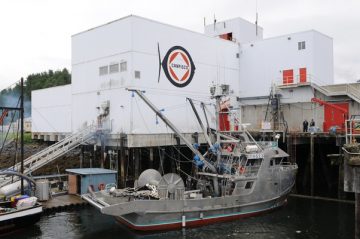
British Columbia Wild salmon plan panned by conservation groups
The B.C. government’s new wild salmon strategy is a missed opportunity, says the executive director of Skeena Wild Conservation Trust, because it does not contain strong enough measures in the one area where the province has jurisdiction: habitat protection. And the BC Wildlife Federation is concerned that, if the government adopts recommendations of the Wild Salmon Advisory Council, B.C. may follow Alaska on an over-reliance on hatchery production – something which itself may be one of the problems contributing to decreases of certain wild stock species. >click to read<11:20
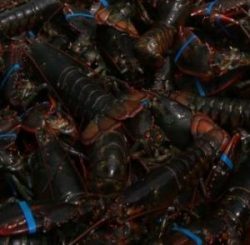
The Data Shows Record Lobster Production
Marine fisheries data show New England lobstermen are benefiting from a new golden age of lobster, thanks in large part to a warming Earth. Yet Democrats in Congress and even lobster lobbyists asserted in House climate hearings earlier in February that global warming is causing a lobster apocalypse. Thankfully, facts and scientific evidence can help us put this latest global warming scare to rest.,,, Overlooking for the moment that Democrats’ PETA allies would consider it good news if global warming were inducing lobsters to relocate to waters where lobstermen can’t reach them, let’s take a look at lobster production in Maine and the rest of New England in recent decades. >click to read<09:36
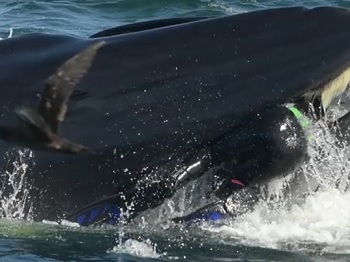
Diver survives after being scooped up in whale’s mouth off South Africa
A diver in South Africa survived an experience out of a biblical passage last month when he ended up almost being swallowed by a whale. Rainer Schimpf, 51, was snorkeling off the coast of Port Elizabeth, South Africa, when he ended up in the path of a Bryde’s whale, which opened his jaws and engulfed him headfirst.”We were very astonished that out of nowhere this whale came up,” he told Sky News. “I was busy concentrating on the sharks because you want to know if the shark is in front of you or behind you, left or right, so we were very focused on the sharks and their behavior — then suddenly it got dark.” Video, >click to read<
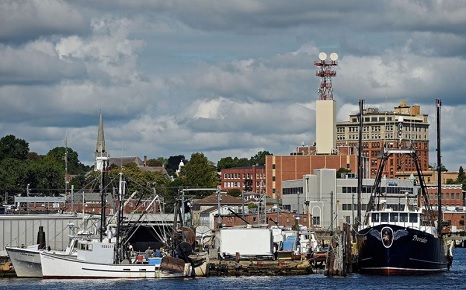
Don’t let wind industry disrupt fishing industry
As owner of Empire Fisheries, one of Connecticut’s largest commercial fishing companies, I testified recently at a hearing before the General Assembly’s Energy and Technology Committee on two bills (SB 875 and HB 7156) in support of the state’s plan to procure clean energy from offshore wind turbines in federal waters. While in support of the bills, I cautioned, as many other fishermen have, that any authorization from the state for procuring wind energy must first guarantee protections that keep fishermen, fish and the ecosystems they rely on, safe. >click to read<15:34

Coast Guard crews rescues 2 from sinking fishing vessel near Fishers Island
Crewmembers from Coast Guard Station New London rescued two people after they abandoned their sinking fishing vessel near Fishers Island, New York, Sunday morning. At approximately 7:30 a.m., watchstanders at Sector Long Island Sound received a radio call from the crew of a 55-foot commercial fishing vessel stating their boat was taking on water in one of their fish holds. (Following a telephone inquiry, the vessel was identified as F/V All For Joy.) Video, >click to read<14:10
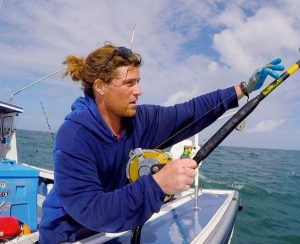
Wicked Tuna exclusive: The new season 8 begins after a rough 2018, preview
Wicked Tuna is back this Sunday on National Geographic Channel. Last season was defined by unstable alliances, shocking injuries, and massive blow ups, and winning is and was anyone’s game. It was also colored by the early death of one very young Wicked Tuna cast member. Our exclusive clip is a preview of the opening day of the bluefin tuna season and Season 8 of Wicked Tuna.,, Old faces return and new young upstarts will add to Season 8, as the core cast must compete and grieve at the same time. >click to read< Wicked Tuna starts with an extended 90-minute episode on Sunday, March 10, at 9/8c on National Geographic Channel13:02






